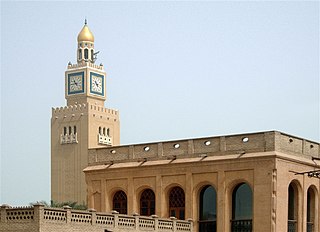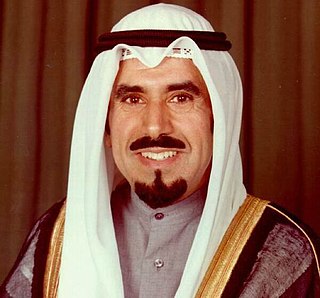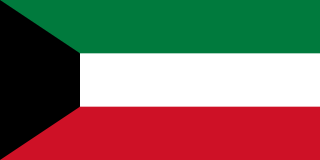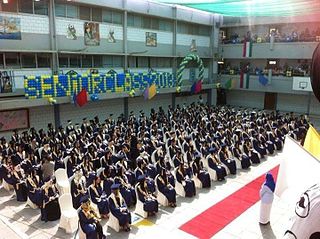
This is a demography of the population of Kuwait.

Kuwait is an emirate with a political system consisting of an appointed judiciary, appointed government, and nominally elected parliament.

Kuwait City is the capital and largest city of Kuwait. Located at the heart of the country on the south shore of Kuwait Bay on the Persian Gulf, it is the political, cultural and economic centre of the emirate, containing Kuwait's Seif Palace, government offices, and the headquarters of most Kuwaiti corporations and banks. It is one of the hottest cities in summer on earth, with average summer high temperatures over 45 °C (113 °F) for three months of the year.

The House of Sabah is the ruling family of Kuwait.

The Gulf War was an armed conflict between Iraq and a 42-country coalition led by the United States. The coalition's efforts against Iraq were carried out in two key phases: Operation Desert Shield, which marked the military buildup from August 1990 to January 1991; and Operation Desert Storm, which began with the aerial bombing campaign against Iraq on 17 January 1991 and came to a close with the American-led Liberation of Kuwait on 28 February 1991.

Kuwait Airways is the flag carrier of Kuwait, with its head office on the grounds of Kuwait International Airport, Al Farwaniyah Governorate. It operates scheduled international services throughout the Middle East, to the Indian subcontinent, Europe, Southeast Asia and North America, from its main base at Kuwait International Airport.

The National Assembly is the unicameral legislature of Kuwait. The National Assembly meets in Kuwait City. Because political parties are illegal in Kuwait, candidates run as independents. The National Assembly is made up of 50 elected members and 16 appointed government ministers.

Sheikh Jaber al-Ahmad Al-Sabah or Jaber III was Emir of Kuwait from 31 December 1977 until his death in 2006.

The Iraqi invasion of Kuwait began on 2 August 1990 and marked the beginning of the Gulf War. After defeating the State of Kuwait on 4 August 1990, Iraq went on to militarily occupy the country for the next seven months. The invasion was condemned internationally, and the United Nations Security Council (UNSC) adopted numerous resolutions urging Iraq to withdraw from Kuwaiti territory. The Iraqi military, however, continued to occupy Kuwait and defied all orders by the UNSC. After initially establishing the "Republic of Kuwait" as a puppet state, Iraq annexed the entire country on 28 August 1990; northern Kuwait became the Saddamiyat al-Mitla' District and was merged into the existing Basra Governorate, while southern Kuwait was carved out as the all-new Kuwait Governorate. By November 1990, the adoption of UNSC Resolution 678 officially issued Iraq an ultimatum to withdraw unconditionally by 15 January 1991 or else be removed by "all necessary means" from Kuwaiti territory. In anticipation of a war with Iraq, the UNSC authorized the assembly of an American-led military coalition.

The Kuwait Liberation Medal is a medal created in 1994 that was issued by the government of Kuwait to both local and foreign military personnel who served in the Persian Gulf War's "Liberation of Kuwait" campaign phase of 1990 and 31 August 1993.

The Kuwait Football Association is the governing body of association football in Kuwait.
Human rights in Kuwait are a topic of significant concern. Most notably, Kuwait's handling of the stateless Bedoon crisis has come under substantial criticism from international human rights organisations and the United Nations. Kuwait has the largest number of stateless people in the entire region. Kuwait also faces significant criticism for the human rights violations against foreign nationals, women, and LGBT people. Although Kuwaiti law theoretically pledges to protect all human rights; the enforcement mechanisms designed to help protect human rights are very limited in Kuwait.

Kuwait, officially the State of Kuwait, is a country in the Middle East. It is situated in the northern edge of Eastern Arabia at the tip of the Persian Gulf, bordering Iraq to the north and Saudi Arabia to the south. Kuwait also shares maritime borders with Iran. Kuwait has a coastal length of approximately 500 km (311 mi). Most of the country's population reside in the urban agglomeration of the capital and largest city Kuwait City. As of 2022, Kuwait has a population of 4.45 million people of which 1.45 million are Kuwaiti citizens while the remaining 3 million are foreign nationals from over 100 countries.

The State of Kuwait, located at the head of the Persian Gulf, supports an educational policy that seeks to provide an opportunity to all children, irrespective of their social class, including children with special needs. Kuwait was ranked 63rd on the Human Development Index report for 2011 by the United Nations Development Programme, placing Kuwait above the regional average.

Kuwait is an emirate with an autocratic political system. The political system consists of an appointed judiciary, appointed government, and nominally elected parliament.

Sabah Al-Ahmad Al-Jaber Al-Sabah was the Emir of Kuwait from 29 January 2006 until his death in 2020.
The Kuwaiti protests refers to the series of 2011–2012 demonstrations for government reforms in the state of Kuwait. In November 2011, the government of Kuwait resigned in response to the protests, making Kuwait one of several countries affected by the Arab Spring to experience major governmental changes due to unrest. The protests began with stateless people (Bedoon).

The Sheikhdom of Kuwait was a sheikhdom which gained independence from the Khalidi Emirate of Al Hasa under Sabah I bin Jaber in the year 1752. The Sheikhdom became a British protectorate between 1899 and 1961 following the Anglo-Kuwaiti agreement of 1899. This agreement was made between Sheikh Mubarak Al-Sabah and the British Government in India, primarily as a defensive measure against threats to Kuwait's independence emanating from the Ottoman Empire.
The COVID-19 pandemic in Kuwait was a part of the worldwide pandemic of coronavirus disease 2019 caused by severe acute respiratory syndrome coronavirus 2. The first confirmed case in Kuwait was announced on 24 February 2020.














